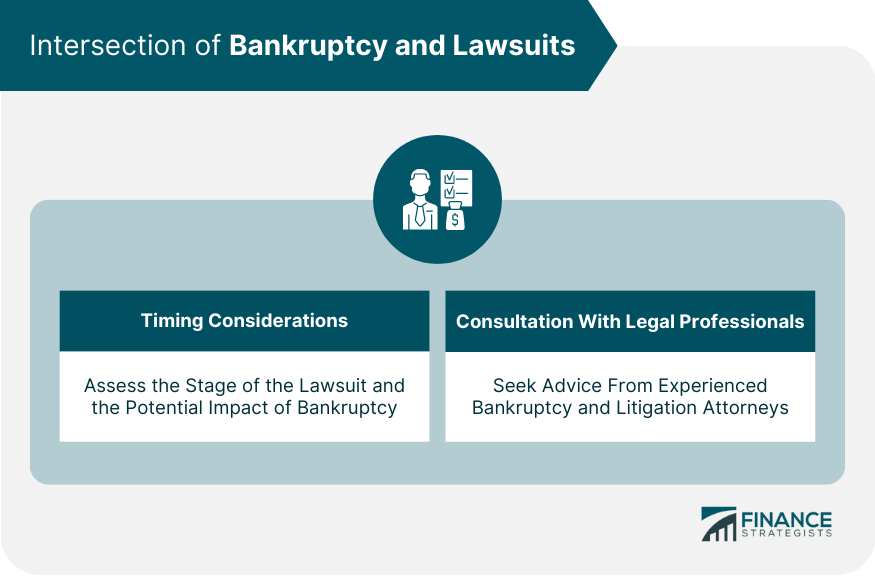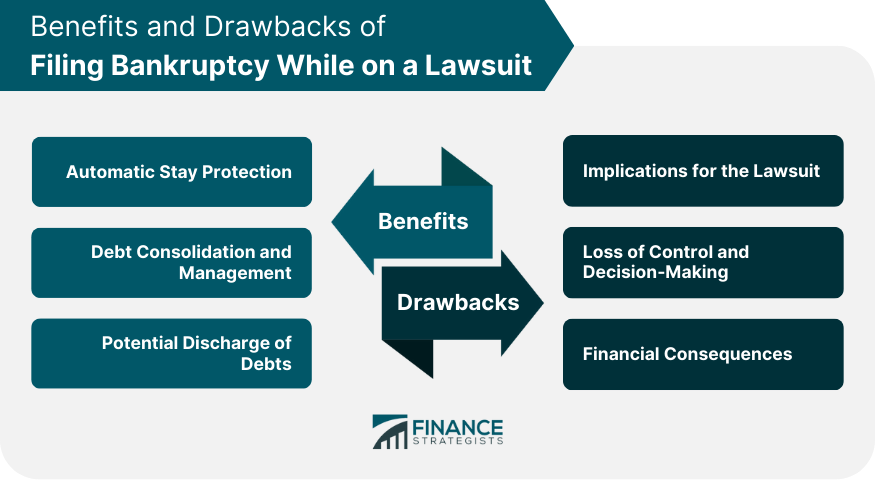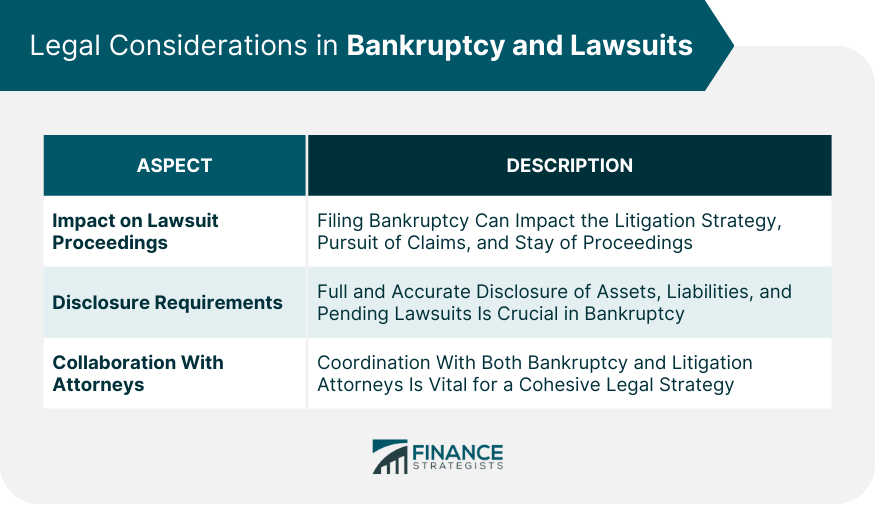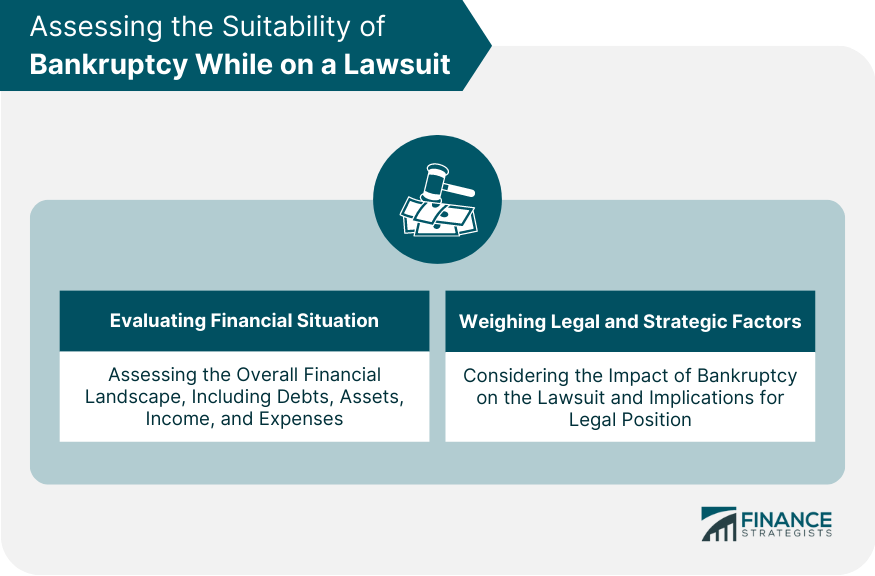Yes, you can file for bankruptcy while involved in a lawsuit. Filing bankruptcy triggers an automatic stay, temporarily halting the lawsuit. The bankruptcy court will assess the impact on the litigation and determine how to proceed, considering the nature and stage of the lawsuit. However, filing bankruptcy can have implications for the lawsuit, such as affecting your ability to recover damages and requiring full disclosure of the ongoing litigation. It is crucial to consult with both bankruptcy and litigation attorneys to understand the potential consequences and legal strategies and make informed decisions based on your specific circumstances. Their expertise will help navigate the complex intersection of bankruptcy and lawsuits and guide you through the process. The intersection of bankruptcy and lawsuits introduces intricate legal dynamics. It requires a careful analysis of how bankruptcy may impact the lawsuit and vice versa. Various factors include timing, disclosure requirements, and the potential consequences for both processes. Timing is crucial when considering bankruptcy while on a lawsuit. It is important to assess the stage of the lawsuit, the nature of the claims, and the potential impact of bankruptcy on the litigation process. Seeking advice from experienced bankruptcy and litigation attorneys is essential. They can provide guidance on how to navigate the complex legal landscape, evaluate the risks and benefits, and make informed decisions based on your specific circumstances. Filing for bankruptcy while involved in a lawsuit can offer certain advantages depending on your situation. One significant benefit of filing for bankruptcy is the automatic stay. This legal protection halts all collection activities, including the lawsuit, providing temporary relief and an opportunity to address your financial difficulties. Bankruptcy allows for the consolidation and management of debts. By filing, you can potentially consolidate your outstanding obligations, including any claims related to the ongoing lawsuit, into a structured repayment plan. Bankruptcy offers the possibility of discharging certain debts, relieving you of the obligation to repay them. This can include debts arising from the lawsuit, depending on their nature and the specific bankruptcy chapter filed. Filing for bankruptcy while involved in a lawsuit also carries certain drawbacks and potential challenges. Filing bankruptcy can have consequences for the ongoing lawsuit. It may affect the litigation strategy, the ability to recover damages, or the ability to pursue claims against others. Bankruptcy can result in a loss of control over the lawsuit. The bankruptcy court takes over the administration of assets, and decisions regarding the lawsuit may require approval from the bankruptcy trustee. Bankruptcy can have financial implications, including the potential for the sale of non-exempt assets, the impact on creditworthiness, and the requirement to pay certain debts through a repayment plan. Navigating the intersection of bankruptcy and lawsuits requires careful attention to legal considerations. Filing bankruptcy can impact the lawsuit proceedings, including the litigation strategy, the ability to pursue claims, or the stay of proceedings while the bankruptcy is pending. When filing for bankruptcy, full and accurate disclosure of all assets, liabilities, and pending lawsuits is crucial. Failure to disclose ongoing litigation can have serious legal and financial consequences. Coordinating with both bankruptcy and litigation attorneys is essential for a cohesive legal strategy. Their expertise will help you navigate the complex requirements of both processes. Determining whether filing for bankruptcy while involved in a lawsuit is appropriate requires a thorough assessment of your financial and legal circumstances. Before filing for bankruptcy, it is important to evaluate your overall financial situation, including outstanding debts, assets, income, and expenses. Understanding your financial landscape will help determine if bankruptcy is the right choice. Consider the potential impact of bankruptcy on the lawsuit and the implications for your legal position. Evaluate the risks and benefits of bankruptcy in light of your specific litigation circumstances. Filing bankruptcy while involved in a lawsuit requires careful evaluation of the legal and financial implications. Timing, consultation with legal professionals, and weighing the benefits and drawbacks are crucial. Bankruptcy offers an automatic stay, debt consolidation, and potential debt discharge, but it may impact the lawsuit, control, and finances. Disclosure, collaboration with attorneys, and assessing one's financial situation are key considerations. Navigating the intersection of bankruptcy and lawsuits requires a comprehensive understanding of the legal landscape. Seeking guidance from experienced professionals ensures informed decision-making in this complex process, safeguarding the best interests of individuals facing a lawsuit while contemplating bankruptcy.Can I File Bankruptcy While in a Lawsuit?
Intersection of Bankruptcy and Lawsuits
Time Considerations
Consultation With Legal Professionals

Benefits of Filing Bankruptcy While on a Lawsuit
Automatic Stay Protection
Debt Consolidation and Management
Potential Discharge of Debts
Drawbacks of Filing Bankruptcy While on a Lawsuit
Implications for the Lawsuit
Loss of Control and Decision-Making
Financial Consequences

Legal Considerations in Bankruptcy and Lawsuits
Impact on Lawsuit Proceedings
Disclosure Requirements in Bankruptcy
Collaboration With Attorneys

Assessing the Suitability of Bankruptcy While on a Lawsuit
Evaluate Financial Situation
Weigh Legal and Strategic Factors

Conclusion
Can I File Bankruptcy While in a Lawsuit? FAQs
Yes, you can file bankruptcy while involved in a lawsuit. However, it may have implications for the lawsuit, and you should consult with legal professionals to understand the impact on your specific case.
Filing for bankruptcy triggers an automatic stay, temporarily halting the lawsuit. The bankruptcy court will assess the impact on the litigation and determine how to proceed, considering the nature and stage of the lawsuit.
Filing bankruptcy may impact your ability to recover damages in the lawsuit. The bankruptcy court's involvement and potential distribution of assets could affect the amount available for recovery.
Yes, it is essential to disclose all pending lawsuits when filing for bankruptcy. Full and accurate disclosure is required to comply with legal requirements and ensure the integrity of the bankruptcy process.
Yes, it is highly recommended to consult with both bankruptcy and litigation attorneys. They will provide guidance on the potential consequences, and legal strategies, and help you make informed decisions based on your unique circumstances.
True Tamplin is a published author, public speaker, CEO of UpDigital, and founder of Finance Strategists.
True is a Certified Educator in Personal Finance (CEPF®), author of The Handy Financial Ratios Guide, a member of the Society for Advancing Business Editing and Writing, contributes to his financial education site, Finance Strategists, and has spoken to various financial communities such as the CFA Institute, as well as university students like his Alma mater, Biola University, where he received a bachelor of science in business and data analytics.
To learn more about True, visit his personal website or view his author profiles on Amazon, Nasdaq and Forbes.















